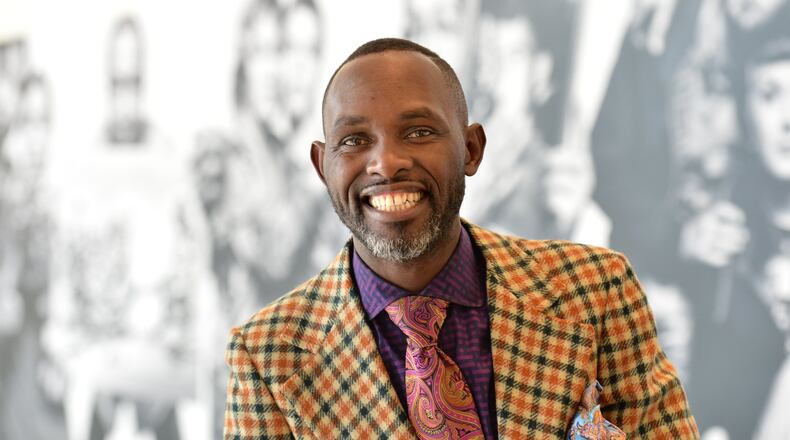Derreck Kayongo, a onetime refugee from Uganda, has been named as the new chief executive officer at the National Center for Civil and Human Rights.
The center made the announcement at a news conference Friday held at the center’s downtown Atlanta facility. Kayongo began his new responsibilities last week.
Deborah Richardson, interim CEO at the center, praised Kayongo’s “lifelong experience as a human rights activist, his lifelong commitment to his work, and his commitment to not only the mission but the vision of the center.”
During an earlier interview, Kayongo, dressed in purple checked shirt and pink paisley tie, spoke about the center as a place for discussion of the serious rights issues of the day.
As those who have seen his TEDx talk can attest, Kayongo is an accomplished orator. "I'm a great articulator," he said, "but how do we move from the talk to the work?" That, he said, will be his mission.
Credit: Hyosub Shin
Credit: Hyosub Shin
The 45-year-old father of two lives in Lawrenceville. He made a name for himself in Atlanta and the world by creating the Global Soap Project, a nonprofit that collects partly used bars of soap from hotels, then sanitizes and recycles the soap to be given to refugees and others around the planet.
Since merging with Clean the World last year, the project has donated 5 million bars of soap, and should give away 10 million next year, he said. In 2011, Kayongo was named a Top 10 CNN Hero. The Atlanta Journal-Constitution wrote about his quixotic quest last year in the Personal Journeys section.
In describing Kayongo’s rhetorical skills, staff writer Matt Kempner wrote, “This is his greatest strength: getting people inspired to see the bigger picture. Convincing them that even the little guy can do something big.”
Kayongo’s career certainly flowered from small beginnings. When Idi Amin triggered a brutal war in Uganda, the 10-year-old Kayongo and his family fled to Kenya, landing among refugees who lacked the basic necessities — including soap.
Immigrating to the U.S. at age 22, Kayongo earned a master of laws in international law degree from the Fletcher School of Law and Diplomacy at Tufts University. He found work in such nonprofits as Amnesty International and Atlanta-based CARE International, where he served as regional field coordinator for the Southeast.
After starting the Global Soap Project in 2008, he left CARE. Today he sits on the board of the soap project, but no longer runs the nonprofit.
During his first tour of the rights center, as his children ran around, he suddenly froze. There, in front of him, was the life-size image of his oppressor. “Idi Amin,” he whispered, “is here.”
The 6-foot cutout of Amin is part of the “Wall of Shame,” a rogues gallery of human rights violators that is part of the center’s third-floor exhibit. Kayongo was delighted to see Atlanta’s emphasis on the continuity between civil and human rights struggles, because he has seen the connection from the other side of the Atlantic Ocean.
Atlanta’s civil rights heroes, such as Andrew Young and John Lewis, are heroes in Uganda and Kenya, too. “It used to be a local discussion, now it is a global discussion,” he said. “The civil rights movement had a baby.”
The National Center for Civil and Human Rights opened in the summer of 2014, after more than 10 years of planning and fundraising and a few setbacks.
Shepherding the center on this bumpy path was Doug Shipman, who was hired early on as a consultant to determine the feasibility of such a center and eventually became CEO.
This past May, Shipman stepped down to become chief executive officer of BrightHouse LLC, an Atlanta-based management consulting group created by Joey Reiman.
“Founders often stay too long,” Shipman said at the time.
The center announced a national search. They found a new boss in their own backyard.
Kayongo should do well as a cheerleader for the organization. He is at ease in front of an audience, and dresses the part of the performer, with a fondness for brightly colored suits, ties and scarves.
He is also a warm personality who is known to hug his interrogator when an interview is over. “That,” he said, “is how we do it in Africa.”
About the Author
Keep Reading
The Latest
Featured



